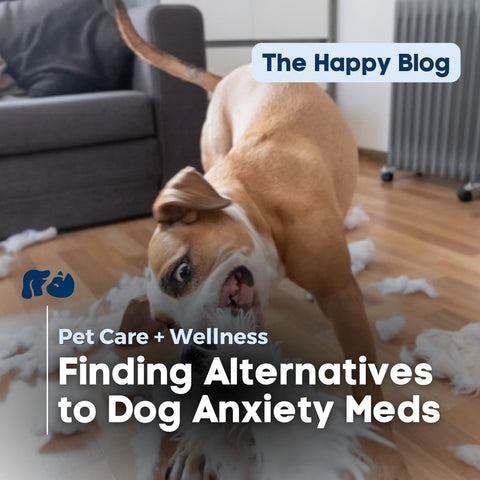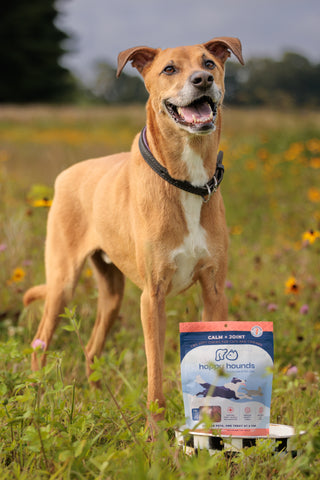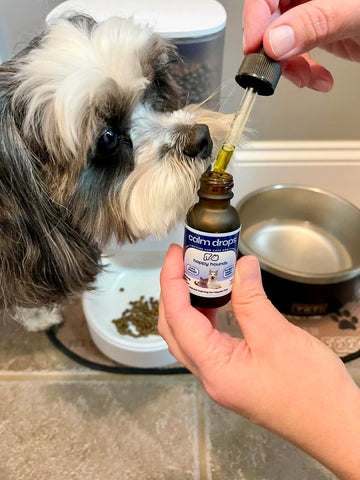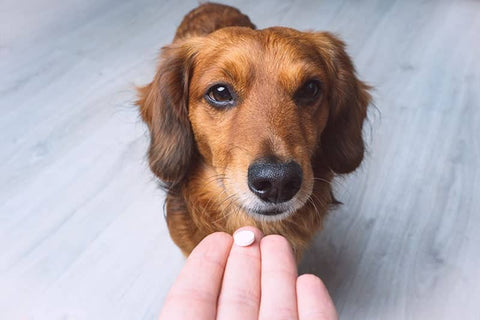The Best Alternatives to Dog Anxiety Meds

Calm at a Cost: Alternatives to Dog Anxiety Meds

Navigating pet anxiety and its treatments for your dog or cat can be a trip. As pet parents, we often go down the list: Is there more I can do? Is there more I could have done? Is it my fault? Is my pet happy?
Your dog can still have an excellent quality of life despite having anxiety. There are lots of options to treat pet anxiety, and we’re here to talk about the most common one, prescription medication.
Often called “puppy prozac,” Fluoxetine is commonly prescribed stress-relief from a class of drugs commonly known as SSRIs, or Selective Serotonin Reuptake Inhibitors. While traditional anxiety medications may offer relief in many cases, there are often drawbacks—from countless vet visits to long-term side effects, and the ultimate cost of the long-term use of heavy duty sedatives.
In this article, we will explore the benefits, alternatives, and long-term side effects of anti-anxiety meds for dogs and cats.
Table of Contents:
- The Trouble with Anxiety Meds
- Unwanted Side Effects
- Fluoxetine: A Temporary Fix
- Long-Term Effects of Puppy Prozac
- CBD vs Prozac for Pets
- The Benefits of CBD
- Training Alternatives
- The Takeaway
Let's face it—medication costs can add up faster than your dog’s zoomies. When put on prescription medication, especially those that work neurologically, most vets require your cat or dog to come in for follow up visits. Alongside medication changes, monthly prescriptions, and sky high vet bills-- it can leave pet parents feeling overwhelmed and under pressure.
In addition, most of these medications require between four and six weeks to take effect. It can also take time to find the correct dosage–with SSRIs, just like any other medication, there is a lot of trial and error.
For separation anxiety or travel anxiety, many pet owners opt for short term fixes like Children’s Benadryl or Trazodone. Like SSRIs for cats and dogs, these pills can have unwanted side effects for your pet.
Decongestants like Benadryl will likely make your pet extra drowsy, which an play into increased anxiety, as they may be nervous to be so sleepy in stressful settings. As an alternative, many cat and dog parents have begun switching to more natural anti-anxiety care, like Hemp or CBD dog treats.
For many pet parents, their dog's anxiety is so severe difficult they do not seek out or have the time to try alternatives. In fact, 57% of dog owners report that their fur babies are anxious. And that can come with a big price tag, owners of anxious dogs report spending up to $400 per year on stress relief care and medication.
The Trouble with Puppy Prozac
For situational anxiety like travel, many cat and dog parents opt for short term fixes like Benadryl, Trazodone, or Gabapentin. Like SSRIs for cats and dogs, these pills can have short term benefits, but underlying or unwanted side effects. As an alternative, many cat and dog parents have begun switching to more natural anti-anxiety care, like CBD.
While anxiety medication can offer relief for some pets, the potential for long-term side effects is common. From liver damage to changes in behavior, the risks may outweigh the benefits for some. Of course, not all medication is the same, and no two pets are alike, but consult your veterinarian for any adverse reactions.
Commonly reported side effects of Fluoxetine include:
- Lethargy
- Panting
- Loss of Appetite
- Increased Anxiety
- Vomiting and Diarrhea
More serious side effects may include:
- Seizures
- Tremors
- Weight Loss
- Serotonin Syndrome
- Aggression + Reactivity
- Restlessness or Disrupted Sleep
The “Temporary” Fix of Fluoxetine
A major concern for long-term use of puppy prozac, like drowsiness or increased aggression can disrupt your pet's quality of life. According to Dog’s Health, “Prozac is often prescribed for a short period of time until the behavior modification program takes hold.” Most pets begin SSRIs only as a temporary additive while they work to modify behaviors through conditioning and training, but many pet parents admit to their cat or dog being prescribed SSRIs for years or even over the course of a lifetime.
For younger dogs, it can upset training sessions by affecting their ability to soak up new information. While dog and cat anxiety meds are helpful for more serious cases of stress, and fear — it is not a magic pill. They can take a while to dose correctly and show noticeable improvements. Some of those changes have the possibility to negatively impact your pet's quality of life.
Because of these drawbacks, many pet parents are looking for alternatives to dog anxiety meds for long-term wellness. Oftentimes, stepping down on dose and frequency while they work on behavior modification.
A Holistic Approach to Pet Wellness
Hemp or CBD (Cannabidiol) has emerged as a promising natural alternative for managing pet anxiety. Derived from the hemp plant, CBD interacts with the endocannabinoid system to promote balance and calm in pets. Many pet parents use CBD for a variety of reasons, and it can be a beneficial and holistic approach to reduce anxious or reactive behaviors in both dogs and cats.
CBD Dog Treats and Tinctures work a lot faster, which is great for situational behaviors like separation anxiety or reactivity to other dogs on walks, showing responses in hours rather than weeks, and has benefits beyond just behavioral.

Happy Hounds for Pet Anxiety Relief
Happy Hounds CBD embodies a holistic approach to pet wellness, supporting overall health and vitality. It is one of the best alternatives to anxiety med for dogs. By promoting balance within the body, their CBD Oil and Treats helps pets thrive physically, mentally, and emotionally. The natural relief that aligns with the holistic principles of caring for our companions.
The Benefits of CBD vs Prozac
- Affordable + Convenient
Unlike pricey scrips, Hemp offers an affordable solution for pet anxiety. With a range of products to choose from, Happy Hounds has affordable alternatives that fit your budget without compromising on quality. Unlike prescription medication, CBD does not require trips to the vet and can be bought over-the-counter for pet anxiety. at most pet supply stores or online, to save you all of that back-and-forth to follow-up visits.
- Variety of Natural Benefits
CBD isn't just for anxiety—it has a multitude of benefits for various conditions like reducing inflammation and joint pain, improving gut health, calming the symptoms of allergies, and relieving irritated skin. Hemp offers a holistic solution to overall pet wellness, all while keeping anxious and reactive behavior at bay.
- Used as a Regimen Booster
Whether you choose to incorporate CBD as a natural additive to your pet's regimen or opt for it as a standalone treatment, the versatility of CBD treats as a topper or oil tinctures in wet food or on other treats can be a safe and effective solution.
- Tasty and Easy to Add
CBD dog treats for anxiety are not only delicious for pets but also a hassle-free way to incorporate it into their daily routine. For picky eaters or pets with sensitive stomachs, CBD Oil offers a longer lasting solution that can be easily mixed into food or enrichment items like Kongs and Licki Mats.
Check out our article in the Happy Pets Blog to check out if your pets would prefer treats vs tinctures.
- Stress-Free Administration
Giving your pets medication can be a stressful, for both parties. With CBD treats, dogs can say goodbye to the struggle of forcing pills down your pet's throat or hiding medications in their food (they always find) with calming pet treats and tinctures. They offer a stress-free way to incorporate relief into your pet's daily routine.
You won’t have to trick your pet into taking prescriptions or chase them around the house. Instead, you’ll be saying “no more!” after they enjoy a tasty treat.
Is CBD Safe for Dogs?
Non-Psychoactive and Non-Intoxicating:
Unlike CBD’s hipster cousin, Cannabis, the compound found in Cannabidiol (CBD) or Hemp is non-psychoactive and non-intoxicating. This means your pet can enjoy the calming benefits of the plant without getting high.
It's a safe and gentle option for pets of all shapes and sizes. Every cat and dog is unique, and what works for one may not work for another.
With CBD, pet parents have the flexibility to tailor treatment plans to their pet’s specific needs. Whether it's adjusting dosage levels or exploring different methods for more treat-motivated dogs by adding oil to their high-value treats.
Pet parents can easily find the right solution for their pet's anxiety without the pills.
Using CBD for Anxiety as Pets Age
As your dog pets age, they may experience increased anxiety due to changes in mobility, cognitive function, or environmental stressors. Happy Hounds CBD can be especially beneficial for senior pets with age-related anxiety.
According to Animals, there is a clear connection between hip and joint discomfort in senior dogs and anxious behavior. Senior dogs suffering from arthritic joint pain often demonstrate odd behaviors when they are in pain. From overlicking at the source to acting out due to the stress of pain.
Happy Hounds’ Calm + Joint soft-chews can help your senior cat or dog enjoy their golden years with comfort and tranquility—without the fear of stress on their aging organs. For senior cats, we recommend the Calm + Coat Drops with salmon oil and turmeric, a strong combination of antioxidants and omega-3 fatty acids.
CBD isn’t just for older dogs, of course! It can reduce reactivity and stress in young and middle aged dogs and cats, all while providing a range of benefits for their longevity and health.
Transparency and Safety:
When it comes to CBD, transparency is key. Look for reputable companies that provide third-party lab reports to ensure the purity and potency of their products. Happy Hounds does third party lab testing to ensure your pet’s safety!
By prioritizing your pet’s safety and our quality, you can have peace of mind knowing your dog’s calming care is not coming at a cost. Check out our extra-strength Calm Drops that are a heavy duty answer. (see Jake, the Shih Tzu enjoying his Calm Drops with dinner)

Can You Outtrain Pet Anxiety?
Investing in professional training can work wonders for anxious pets. Certified trainers can teach techniques to modify behavior and create a positive environment for your pet. Our friend Tess Marty, owner of Tess Marty Dog Training, specializes in reactivity and anxiety using force-free, positive reinforcement methods.
As an expert dog trainer, Tess has seen it all with her clients in New York City. From the bustling streets to loud sirens and construction, her experience in helping dogs through stressful situations is bar none.
“In my experience, I’ve seen so many dogs put on ‘puppy prozac’ when their anxiety was mild or only exhibited during certain situations. I’ve also seen plenty of dogs who have had side effects from these medications when training probably would have been a viable option. That’s not to say anxiety medications don’t have a place in behavior modification, I’ve definitely seen dogs benefit from SSRIs too, but I like to give training or holistic calming agents like CBD a try first, to keep away from any of those nasty side effects prozac can have.”
How Do I Desensitize My Anxious Dog?
Desensitization is a gradual process of exposing your pet to anxiety triggers in a controlled setting, helping them build confidence over time. By pairing positive experiences with negatively associated stimuli, you may be able to help your pet overcome anxiety without medication, or help to limit your pet's time on sedatives.
An example of desensitizing would be exposing your pet to a trigger (i.e. a vacuum) at a low-stress level (i.e. in another room), and slowly building up sound and lessening distance until the pet can cope with the trigger.
Counter-conditioning is the process of changing an association with a stimulus. a trigger that creates a negative response is paired with something that creates a positive response. An example would be changing a behavior like barking at a dog (a negative response) to adding treats to change the behavior to looking at you for a treat (a positive response).

If your cat or dog’s anxiety is unmanageable, using the mentioned alternatives may be worth the time and cost. Behavioral veterinarians are almost like pet therapists, from diagnosis to personalized treatment plans that actually address your pet's anxiety.
The Takeaway
Dealing with pet anxiety can be stressful and scary, but it’s important to remember that you are not alone. There are lots of solutions to anxiety, and what might work for one cat or dog may not work for another. Considering prescription medication is a big step, so it is crucial to discuss with your vet and trainer to weigh the benefits.
It may be in your pet’s best interest to try some alternatives to anxiety meds so they can find calm without negative side effects or long-term health consequences. If there are short-term or situational stressors in your pet’s life, it may be more prudent to try CBD treats and incorporate behavioral training, so they can thrive.





1 comment
I missed my opportunity to speak to you at today’s Cavapoo Wellness event at ZoomRoom Chelsea. I had wanted to discuss trying cbd for my dog’s anxiety about riding in cars. Is there a way to connect with you again?